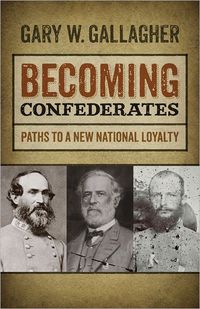

Purchase
Paths to a New National Loyalty
University of Georgia Press
May 2013
On Sale: May 1, 2013
152 pages
ISBN: 0820345407
EAN: 9780820345406
Paperback
Add to Wish List
Non-Fiction History | Historical
In Becoming Confederates, Gary W. Gallagher explores
loyalty in the era of the Civil War, focusing on Robert E.
Lee, Stephen Dodson Ramseur, and Jubal A. Early—three
prominent officers in the Army of Northern Virginia who
became ardent Confederate nationalists. Loyalty was tested
and proved in many ways leading up to and during the war.
Looking at levels of allegiance to their native state, to
the slaveholding South, to the United States, and to the
Confederacy, Gallagher shows how these men represent
responses to the mid-nineteenth-century crisis.
Lee
traditionally has been presented as a reluctant convert to
the Confederacy whose most powerful identification was with
his home state of Virginia—an interpretation at odds with
his far more complex range of loyalties. Ramseur, the
youngest of the three, eagerly embraced a Confederate
identity, highlighting generational differences in the
equation of loyalty. Early combined elements of Lee's and
Ramseur's reactions—a Unionist who grudgingly accepted
Virginia's departure from the United States but later came
to personify defiant Confederate nationalism.
The
paths of these men toward Confederate loyalty help delineate
important contours of American history. Gallagher shows that
Americans juggled multiple, often conflicting, loyalties and
that white southern identity was preoccupied with racial
control transcending politics and class. Indeed,
understanding these men's perspectives makes it difficult to
argue that the Confederacy should not be deemed a nation.
Perhaps most important, their experiences help us understand
why Confederates waged a prodigiously bloody war and the
manner in which they dealt with defeat.
Comments
No comments posted.
Registered users may leave comments.
Log in or register now!
| 


 © 2003-2025 off-the-edge.net
all rights reserved Privacy Policy
© 2003-2025 off-the-edge.net
all rights reserved Privacy Policy